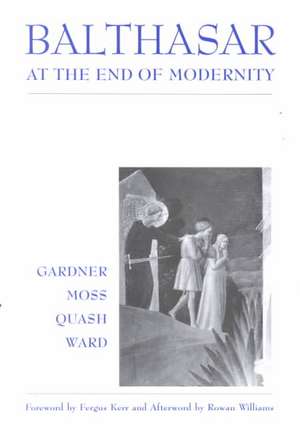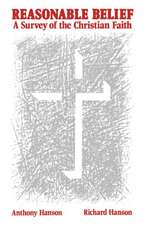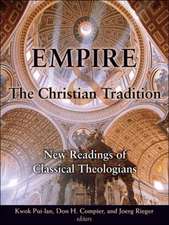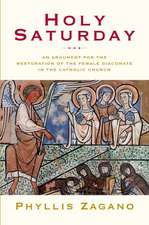Balthasar at End of Modernity: Race
Autor Lucy Gardner, David Moss, Ben Quash, Prof. Graham Warden Limba Engleză Paperback – 31 ian 2001
Preț: 373.07 lei
Preț vechi: 419.17 lei
-11% Nou
Puncte Express: 560
Preț estimativ în valută:
71.41€ • 77.59$ • 60.02£
71.41€ • 77.59$ • 60.02£
Carte tipărită la comandă
Livrare economică 22 aprilie-06 mai
Preluare comenzi: 021 569.72.76
Specificații
ISBN-13: 9780567087041
ISBN-10: 0567087042
Pagini: 208
Dimensiuni: 156 x 234 x 11 mm
Greutate: 0.3 kg
Ediția:Revised
Editura: Bloomsbury Publishing
Colecția T&T Clark
Locul publicării:London, United Kingdom
ISBN-10: 0567087042
Pagini: 208
Dimensiuni: 156 x 234 x 11 mm
Greutate: 0.3 kg
Ediția:Revised
Editura: Bloomsbury Publishing
Colecția T&T Clark
Locul publicării:London, United Kingdom
Cuprins
Foreword: Assessing this 'giddy synthesis' Fergus Kerr Kenosis: Death, discourse and resurrection Graham WardSomething like time; Something like the sexes - an essay in reception Lucy Gardner and David MossDrama and the end of modernity Ben Quash Afterword: Making differences Rowan Williams
Recenzii
'If you've written off Hans von Balthasar as hopelessly retrograde, this book will be enormously profitable for you to read. And if you've become more and more fascinated by Balthasar, this book will be enthralling. And if Balthasar is neither her nor there for you - well, it is still an exciting read. It is not yet another patient exposition of the master's thought but something much more likely to draw the reader into a lively and constructive conversation; namely, an illuminating collection of essays exploring our contemporary awareness of difference, of the agonising deferral of meaning, and of the painful and tragic divides of history.' Mark McIntosh, Loyola University Chicago, Reviews in Religion and Theology 'Framed by Fergus Kerr's urbane positioning of Balthasar's theology in relation to neo-scholasticism and the nouvelle théologie, and Rowan William's masterful meditation on the difficulty of thinking difference, and situated neither for nor against, but within Balthasar's heady theology, the three extended essays in this book offer richly complex and fascinatingly convergent reflections on the drama of the gendered body as divine analogy. They are the fruit of a new theology for a new millennium, after modernity, espying in the temporalities of the flesh the gift and promise of the trinitarian life, that re-enchants the world and lights up the sky.' Dr Gerard Loughlin, University of Newcastle-upon-Tyne 'The best of the main essays is that of Ben Quash. With great clarity, he presents and critiques Balthasar's 'dramatic' mode of Christian theology. There is even a suggestion that modernity is not all bad - that it can open a space for doubt and questioning, which Balthasar closes off too quickly. [. . .] Much careful work is on display, and there are flashes of great insight into the nature of analogy, and the self-giving of God.' Steven Shakespeare, Theology 'There are some virtuoso passages here: Ward's explorations of Julia Kristeva's breaktakingly rich exploration of depression and its links with the death of Jesus is extraordinary. [. . .] William's summary of Balthasar's Trinitarian thinking is a tour de force.' Chris O'Gorman, Affirming Catholicism 'Balthasar at the End of Modernity marks a significant broadening of the standard appropriation of von Balthasar's theology. The present collection of essays will no doubt be only the beginning of a much needed critical engagement with Balthasar's monumental legacy.' Cathy Jones, Heythrop Journal
"...a new and significant study of this Swiss theologian." - Concilium, 3/2001
"...a new and significant study of this Swiss theologian." - Concilium, 3/2001











